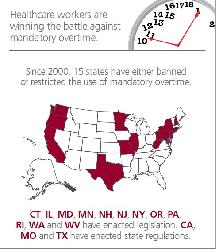
Bans on mandatory overtime gain momentum
Pennsylvania is latest state to pass legislation
Healthcare workers are winning the battle to end mandatory overtime state by state. In the last eight years, 15 states either have banned mandatory overtime in healthcare facilities or have restricted its use. Just last year, two states, New York and Pennsylvania, won bans after protracted lobbying efforts.
The most recent win, in Pennsylvania, came after nurses and health professionals spent eight years trying to persuade lawmakers to pass the legislation. In October, the bill banning mandatory overtime finally passed and was signed by Gov. Edward Rendell.
Pennsylvania's new law prohibits hospitals and healthcare facilities from forcing nurses and other direct patient-care workers to work overtime except in emergencies or during unforseen staffing shortages. The ban goes into effect in July 2009.
"This is a boon for all healthcare workers who would have a hard time gettng this type of legislation passed for their job descriptions, but who suffer from the same abuse of overtime as nurses," says Terry Myers, president of the Armstrong Nurses Association and vice president of Health Care-PSEA (Pennsylvania State Education Association), an AFT Healthcare affiliate.
"Getting this legislation passed was a long and difficult process," says state Rep. Dan Surra, the bill's sponsor. "It would not have happened without the support and advocacy of this state's nurses and other healthcare workers, who came to the Capitol year after year to make their voices heard and ensure lawmakers knew that mandatory overtime was unsafe and unfair for both nurses and their patients. This is a huge victory for both."
Over the years, nurses and health professionals have had to dispute the state hospital association's claims that hospitals could not remain open or provide patient care without the use of overtime, says Beth Pardee, president of Health Care-PSEA.
The healthcare workers provided testimony and information on alternatives to mandatory overtime that would preserve safe patient care and maintain safe working conditions.
Pardee notes that the committed efforts of a variety of unionized healthcare workers helped get the bill passed. "In Pennsylvania, several unions represent various classifications of employees, so it was important to address all workers," she says. "While we often think of nurses at the patients' bedside, there are many other disciplines that are part of the healthcare team. We worked together to accomplish this goal."
The victory gives healthcare workers much needed recognition, says Pardee. Now that the ban on mandatory overtime has become law in Pennsylvania,"we feel that others realize the importance of providing safe, quality care to our patients."
Reprinted from HealthWire, the national publication of AFT Healthcare professionals.
